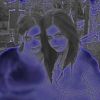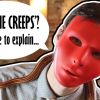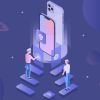-
Video/Audio+20 +2
What Pays More Money: Doctor or YouTuber? (How much I've made from YouTube Shorts in 6 months)
-
 +23 +4
+23 +4A Brief Scientific History of Glass
Featuring ingots, shipwrecks and an international trade in colors, the material’s rich past is being traced using modern archaeology and materials science.
-
 +26 +8
+26 +8Neal Stephenson on his new geoengineering climate change thriller and coining the term 'metaverse'
Author Neal Stephenson shot to fame almost 30 years ago with the science-fiction novel “Snow Crash,” which envisioned a future dominated by mega-corporations and organized crime, competing for dominance in both the real world and the “metaverse,” a computer-generated world accessible through virtual reality headsets.
-
 +20 +3
+20 +3I spent hours waiting to find out what an NFT looks like IRL
"It’s crazy, bro, we live in a fucking video game."
-
 +14 +1
+14 +1Researchers Are Figuring Out Why Some People Can 'Hear' The Voices of The Dead
In sciencealert.com published an article which states that Scientists have identified the traits that may make a person more likely to claim they hear the voices of the dead. According to research published earlier this year, a predisposition to high levels of absorption in tasks, unusual auditory experiences in childhood, and a high susceptibility to auditory hallucinations all occur more strongly in self-described clairaudient mediums than the general population.
-
 +15 +2
+15 +2Here's why you should always close the toilet lid when you flush
The average person flushes the toilet five times a day and, apparently, most of us are doing it wrong. Get ready for some hard truths about why you should always leave the lid closed when you flush. When you pull the lever, in addition to taking whatever business you’ve left behind down into the sewer pipes, your toilet also releases something called “toilet plume” into the air — which is basically a spray filled with microscopic bacteria, including E. coli.
-
 +20 +1
+20 +1Bane-Like Razer Zephyr N95 Mask Is Real, and You Can Buy It
Razer is taking on the COVID-19 pandemic by launching its new Zephyr face masks, which are designed to keep gamers safe — if you’re brave enough to wear them in public. Though the Razer Zephyr, originally announced as Project Hazel, has a similar black-clad aesthetic as most of the company’s gaming laptops, the gaming-forward, RGB-lit dual fans on your face could make the contraption seem a bit ostentatious as a face covering. Don’t expect to go incognito when you’re donning the Zephyr.
-
 +16 +2
+16 +2Check out the original 1851 reviews of Moby-Dick.
On the occasion of its 170th publication anniversary, here are the very first reviews of Herman Melville’s leviathan-sized opus of obsession, revenge, and meticulously detailed whaling practices.
-
 +13 +1
+13 +1Why Stories About Filthy Rich People Fascinate Us
There’s very little Succession’s Roy family has in common with most people. Falcon business jets and vacation yachts? Not your average day. Or The White Lotus’s guests vacationing in an exotic, five-star resort; CFO Nicole Mossbacher’s ideas sit in an alternative world. Even the sprawling extravagance in Crazy Rich Asians does little to connect with the average viewer. You know, with the wedding at Singapore’s Garden By the Bay and all.
-
 +12 +2
+12 +2Uranus Used To Be Called the Schoolyard-Friendly Name George
The seventh planet from our sun gets a lot of flack for its name, but the ice giant Uranus wasn’t always called that. For nearly 70 years after it was discovered, it went by a much less unfortunate name: George.
-
 +11 +3
+11 +3Would we still see ourselves as 'human' if other hominin species hadn't gone extinct?
In our mythologies, there’s often a singular moment when we became “human”. Eve plucked the fruit of the tree of knowledge and gained awareness of good and evil. Prometheus created men from clay and gave them fire. But in the modern origin story, evolution, there’s no defining moment of creation. Instead, humans emerged gradually, generation by generation, from earlier species.
-
 +11 +3
+11 +3The Influence of Buddhism and Taoism in Aleister Crowley’s Work
Writing about Aleister Crowley is a big responsibility. In a world that indoctrinates people into seeing the reality through a lens of duality (God or the Devil, Heaven or Hell, right or wrong), to understand Crowley and his importance to the mysticism requires us to go pass this dual vision, as he did in his life and development of his work.
-
 +12 +1
+12 +1Why is there Something Rather than Nothing?
The cosmological argument is a formidable argument for the existence of God. It’s not a single argument but a family of arguments with a similar theme. While there are several different versions of the argument, it’s unfortunately one of the most misunderstood.
-
 +17 +1
+17 +1Food myths busted: dairy, salt and steak may be good for you after all
A new Swedish study says decades of official dairy wisdom is wrong. Here, a nutrition expert examines more science that questions standard health advice
-
 +15 +2
+15 +2Why Snakes and Clowns Are Creepy, but Bears Are Not.
-
 +17 +4
+17 +4My Time with Kurt Cobain
In early 1992, when I first met Kurt Cobain, he and Courtney Love were living in a little apartment in a two-up-two-down building on an ordinary street in the Fairfax section of Los Angeles. I had flown there from New York to interview him for a Rolling Stone cover story, the one with a famous photograph of him wearing a homemade T-shirt that said “Corporate Magazines Still Suck.”
-
 +6 +1
+6 +1Broods, Brains, and Blood: Where Won’t Parasites Go? | Compilation
-
 +16 +4
+16 +4Researchers: The Universe Simulated Itself Into Existence
Yesterday, we looked at “Untitled Earth Sim 64,” a science fiction comedy based on the idea that Earth is a messed up simulation — created by entities that are in themselves simulations. And maybe their simulators were in turn simulated… And so forth. The problem is, where’s the original? Surprisingly, perhaps, there is a physics theory that offers an answer: The universe simulated itself:
-
 +16 +2
+16 +2iPhone Index 2021: How Many Days Do We Need to Afford the New Gadget?
Ranking of iPhone prices to average wages in various countries.
-
 +21 +2
+21 +26 Hacker Pioneers Who Turned the Early Internet on Its Head
In 2021, cybercrime is a normal part of everyday life. But back in the early days of the internet—that is, the 1980s and ‘90s—the hacker was a bizarre new phenomenon that the American public had never encountered before. Many of the trailblazers of this trend weren’t cynical criminals but rather bespectacled teenagers—unadulterated nerds with a penchant for using their advanced computer powers to cause mischief. Back in these days, hacking was less about extortion and moneymaking than it was about hubristic achievement and the desire to do something that had never been done before.
Submit a link
Start a discussion




















